Peter MALONE
Men
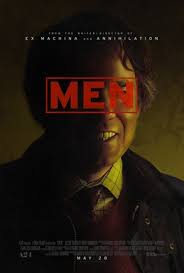
MEN
UK, 2022, 100 minutes, Colour.
Jessie Buckley, Rafe Kinnear, Paapa Essiedu, Gayle Rankin.
Directed by Alex Garland.
Writer-director Alex Garland (Ex Machina, Annihilation) would probably not be surprised or upset to read such words as “enigmatic” or “weird” in connection with this film. It would seem that he has intended it to be enigmatic and weird.
The enigmatic is in the theme. The weird is in the treatment. And there is always the question as to why he entitled the film “Men”, making us look closely at the men male characters and their attitudes and behaviour, although the central character is Harper, woman.
Nor would the writer-director be surprised when reviewers express cautions as to how audiences might respond, how audiences might be too puzzled, confused, and not want to continue. Or, walk out. It is that kind of film.
It begins conventionally enough, focusing on Harper, played by Jessie Buckley was made such an impression in recent years (Wild Rose, Judy, The Lost Daughter, the American television series, Fargo). At her window, she sees a man falling to his death. We then learn that it is her husband from whom she is being divorced. This episode pervades the film and her memories and conscience.
Wanting to break free, Harper rents a 500-year-old house in the Gloucestershire countryside, delighted with the house, the countryside, and phoning her friend, Riley, constantly. What could go wrong?
Well, almost everything! And the narrative moves into some of the conventions of terror and horror.
And the men? Except for the husband, James (Paapa Essideu) and a strange young man in the village, all the male characters are played by Rafe Kinnear. This is certainly a virtuoso screen presence. He plays the landlord of the mansion, the touch of the dithery. He is also the local policeman as well as the man behind the bar at the local pub and several of those sitting drinking. When Harper goes into the church, her flashbacks tormenting her and she screams, Kinnear appears as the local vicar, offering some sympathy but turning the situation back on herself, making her blame herself. He also appears as a naked man who seems to be stalking Harper, who appears frequently, but increasingly tormented, metal spikes emerging from his skin, and then a visual horror climax which has to be seen to be believed. Perhaps it does not have to be seen, and might be too much for some audiences. Weird is the appropriate word.
So, a review which indicates the enigmatic and weird of the film, the core of the plot and issues, and, hopefully, a sensible caution about the style of the horror touches.
- The films of Alex Garland? Science, science fiction, touches of horror?
- The title, generic, the male characters in the film, men in general, the fact of glory can hear playing the male parts? Conclusions to be drawn from these characters, from James, from the young man?
- Harper’s story, the opening, in her flat, the man falling to his death, looking at her, her reaction? The gradual filling out the background, the flashbacks to her discussions with James, initial love, the tension, the discussion about divorce, his hitting her, her ousting him? The fact of his going upstairs, to get to her flat, falling, deliberate or not, impaled? And his later reappearance and condemning her?
- Harper, the effect of the marriage, the divorce, booking the house in the country, meeting Jeffrey, the tour, settling in, the walk in the countryside, the enigmatic figure, a sense of fear, the rain, return to the house?
- The naked man, his appearance, Harper’s reaction, fear, his coming to the house? Calling the police, her descriptions? His later reappearance is, the metal coming from his body, spikes, suffering, overtaken by the metal? The finale, his giving birth, continually giving birth, the horror effect? Visuals?
- Jeffrey, the landlord, fussy, friendly, his visits, reassuring Harper, the pub? The end, coming to resolve the situation?
- Harper going to the church, her screen, her memories, the encounter with the vicar, his initial sympathy, the discussions, his gentle tone, turning the tables on her, getting her to accept the blame? Her fleeing him? The later encounter, stabbing him, killing him?
- The policeman, doing his duty, but appearing later, in the pub, at the house, vanishing?
- The men in the pub, at the bar, the customers? All played by Rory Kinnear?
- The young man, associated with a church, wanting to play hide and Seek, his verbal attack on Harper? His later reappearance?
- Harper, nightmare, how much in reality, how much in her mind, her conscience? The continued phone calls to Riley, Riley arriving, reassuring Harper?
- The audience sharing Harper’s experience? The sense of menace and stalking? The final horror? And the conclusions about Men?
Lightyear
LIGHTYEAR
US, 2022, 106 minutes, Colour.
Voices of: Chris Evans, Keke Palmer, Peter Sohn, Takia Waitit, James Brolin, Uzo Aduba, Mary McDonald-Lewis, Isiah Whitlock, Bill Hader, Angus McClain.
Directed by Angus MacClane.
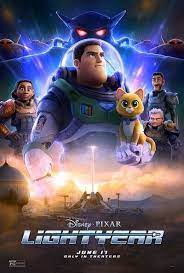 Toy Story fans have a soft spot for astronaut, Buzz Lightyear (who was voiced by Tim Allen but now by Chris Evans, Captain America). The film opens with the information that back in 1995, young Andy chose to have Buzz as one of his toys because he watched a film about Buzz. And, we are told, this is the film. Perhaps the point is whether we would have chosen a Buzz Lightyear toy after seeing this film. Perhaps…
Toy Story fans have a soft spot for astronaut, Buzz Lightyear (who was voiced by Tim Allen but now by Chris Evans, Captain America). The film opens with the information that back in 1995, young Andy chose to have Buzz as one of his toys because he watched a film about Buzz. And, we are told, this is the film. Perhaps the point is whether we would have chosen a Buzz Lightyear toy after seeing this film. Perhaps…
Really, this is a film about outer space with all kinds of spacecraft, techniques, special effects, and ease in moving about that might make the crew of the Enterprise quite envious. And, instead of Klingons, there are all kinds of robotic creatures, menacing and destructive, out there in space.
So, this starts, along with Andy’s sensibilities, as a kind of Space Boys Own Adventure with Buzz at the helm, encountering another space champion who challenges him – but he is responsible for her disappearance. Later, Buzz encounters a really oddball group, Izzy, who has great memories of her grandmother who had written a lot of books, including admiration for Buzz. Izzy has read all the books and knows who Buzz is. With enterprise, Izzy makes the film is something of a Space Girls Own Adventure.
But, it turns out, they are volunteers, with minimal training, although their first vigorous enterprise in rescuing Buzz serves them well for future action. Along with Izzy, is Derby Steel, an old tough veteran who is on parole for stealing a spacecraft, wary about picking up guns because of breaking parole! But, the oddest of all is Mo Morrison. Audiences may be wondering where Mo got his unusual accent, British? From where? But those who enjoyed the Thor movies may realise quickly, others eventually, that it is actually Taika Waititi, the prominent New Zealand comedian and director (Jo Jo Rabbit). He gets all the best funny dialogue and makes the most of it. Actually, the rival for the comedy action and lines is the robot cat, Socks, entertaining but essential for resolving the action sequences.
There are villains, there are military commanders, there is all kinds of adventures in space, Buzz a kind of by the book hero as he was in the Toy Story films, but having a soft spot and basically kind under all the earnest heroics.
Not sure that it will appeal to all the Toy Story fans or that all the action show will entertain the toddlers. But, meeting Buzz again and sharing his adventures offer animated adventure, to infinity – and beyond..
- The popularity of Buzz Lightyear? The Toy Story films? As a space character, as a hero, yet bumbling? His own film?
- The explanation 1995, Andy seeing this film and choosing Buzz is a toy? If we were and the then, would we?
- The animation, space, spacecraft, action, technology? The voices, serious and comic? The team, Izzy, Darby, Mo, comic action, especially from Mo and his dithering? Socks as an entertaining robot cat, in on all the action?
- The opening, Buzz and the mission, the commander, the rookie, dictating his memoirs, the attack, the narrow escape?
- Buzz, and the grandmother, working together, her admiration for him, vice versa, the mission, the dangers, the effect on the grandmother? Her book and praise of Buzz?
- Buzz, later, the encounter with Izzy and the crew, the explanations, the characters, action, comic dialogue, and meeting with Socks?
- The range of action adventures, audience identifying, the various heroic actions, mishaps? The creatures, the enemy, the range of robots? Combating the robots?
- The final action, Izzy and her heroism, fear of space, going to space, guided by Socks? Rescuing Buzz, buzz balancing the space ship, the landing?
- The commander, seen from the past, his reaction to Buzz in the action, reprimanding him, then promoting him – and the team, the uniforms, Mo and his finding the pen (and the jokes about the pen throughout), Darby out on good behaviour but not with a change of attitude!
- And their all going off to infinity – and beyond?
My Sweet Monster
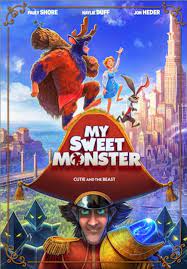
MY SWEET MONSTER
Russia, 2021, 97 minutes, Colour.
Directed by Viktor Glukhushin, Maksim Volkov
This is a 21st century Russian animation film which casts more than a glance at popular Disney films. This is especially true of the old classics with princesses, Snow White, Cinderella, Sleeping Beauty, as well as that most popular of 21st-century Disney princesses, Anna, from Frozen.
By and large this is an old-fashioned fairytale, the young Princess, Barbara, strong-minded as these princesses are. She loves reading about a fairytale Prince, Edward, the Prince of her dreams. Her father, the king, worries about her as do the three rather baboushak-like elderly minders.
Enter a cocky young man, delivering the post, who is able to manipulate the situation, a hold over the King, the demand to marry Barbara, is decking himself out in military gear, even with the Napoleonic hat. What is a princess to do!
This is to go into the forest. Here Barbara meets a genial “monster”, Boogie, looking somewhat human, looking like a giant toy, with flappy ears, with his friend Rabbit, a kind of comic-cousin to Bugs Bunny but more of an outlaw! Actually, Barbara is very irritating and dominating, wanting to invoke Mother Nature. Her friends are in two minds about her, even wanting to send her back to her father. However, the villain pursues her and the rest of the film is a chase and adventures.
The era tends to be coach and horses but there is an excursion into the city, cars, shops, drones, a scheming woman and her fawning assistant who, surprisingly, let Barbara go.
Which all builds up, of course, to a confrontation between Boogie and the Napoleonic would-be – but he has quite a number of powers, the touch of the magic, even commanding Mother Nature to do his bidding.
Boogie, of course, is a hero, defends Barbara, but is transformed into an ice figure. Barbara returns with her father, sad. But, what do princesses do, but offer a kiss. And, of course, a Prince Charming emerges from the trapped Boogie (with a surprising number of tattoos on his arm).
Because it is a princess film, there is an appeal to an audience of girls. The boys in the audience may put up with this for a while but identify with both villain and hero.
Hard to gauge what the target audience age is, perhaps a bit frightening at times for some of the littlies, but probably for the under 12s.
Elvis/ 2022

ELVIS
Australia, 2022, 163 minutes, Colour.
Austin Butler, Tom Hanks, Olivia de Jong, David Wenham, Richard Roxburgh, Helen Thomson, Kate Mulvaney, Kodi Smit-McPhee, Luke Bracey, Dacre Montgomery, Xavier Samuel, Leon Ford, Anthony Phelan, Nicholas Bell.
Directed by Baz Luhrmann.
Audiences who delight in Baz Luhrmann extravaganzas will delight in Elvis. Luhrmann immerses us in the complex life of Elvis, his music and the influences, success and final decline and death. But the film could be sub-titled, Against Colonel Tom Parker, a probing of his advising and exploiting Elvis, a malevolent performance by Tom Hanks.
The reviews of Elvis have been, to say the least, mixed. It would seem that a number of critics have decided to look down on Baz Luhrmann, to condemn his extravagance, to say that his talent is in glitter rather than substance, that in his filmmaking, all surface and shiny, he is self-indulgent. On the other hand, there have been a number of critics who have been very enthusiastic – and, it would seem, that the public would agree with them rather than the nay-sayers.
Which means that we have to make up our own minds! This review is on the side of those in favour!
The first 10 minutes of the film is somewhat overwhelming, a visual collage which takes us into glimpses to Elvis’s young days, to his career, to his final concert, to his death, to the presence of Tom Parker (not necessarily in that order). For audiences with a willing suspension of disbelief, this intriguingly introduces us to what is a portrait rather than a biography of Elvis.
Austin Butler gives a strong in performance as Elvis, a filmic interpretation rather than the kind of show by the myriad Elvis impersonators. He is the naive youngster of 20, from the staff singing with entertainer Hank Snow (David Wenham), friend of his son (Kodi Smit McPhee), a touch nervous, having made a record, but letting loose with his voice, his gyrations, his magnetic charm. And the girls are screaming and swooning!
And there is Tom Parker, the mysterious Dutchman with no real identity, strange accent, entrepreneur in carnivals with sideshows, mesmerised by Elvis and his presence and performance, coming up to him something like Mephistopheles, offering to control Elvis, and Elvis accepting. While we watch Elvis and his drama, there is always the Faustian voice of the Colonel, commenting, justifying himself.
Helen Thomson and Richard Roxburgh portray Elvis’s parents, strong influences on his life, but also manipulated by Tom Parker.
Older audiences will know Elvis’s story well, the initial impact (and a pity that filmmaker Luhrmann gives no indication of the impressive range of films that Elvis made before his military service, showing only those cheery musicals that he made during the 1960s). We know that he went to Germany, met the young Priscilla, married her, Lisa Marie as their child.
Younger audiences will find this an introduction to Elvis, hopefully rousing their curiosity leading to some admiration.
And, all the way through, there are his songs, pre-1960 sung by Austin Butler, post-1960 his lip-syncing to Elvis singing. And, all the way through, thanks for these memories.
The Colonel was responsible for getting Elvis to do military service, get him out of the country as moral authorities were denouncing Elvis and his leading young people astray. It was the Colonel who controlled him in Hollywood. And, it was the Colonel who controlled him in his Las Vegas career, trapping him in contracts, year by year, when Elvis really wanted to travel the world (and the Col citing security difficulties in his refusal, a reality that the Colonel actually had no passport and citizenship).
The initial taking of substances to pep up, the increased drugtaking, Elvis going to fat… Difficulties with Priscilla… And then his death.
Elvis was definitely an icon of the 20th century. He was a top-selling recording artist. He was an extraordinary influence. In Baz Luhrmann wants us to experience something of the razzle dazzle as well as the manipulation by the sinister Colonel Tom Parker.
- The popularity of Elvis Presley? A 20th-century icon? Musical influence? Cultural influence?
- The films of Baz Luhrmann, their style, extravaganza, the visuals, sound, editing and pace, complexity of storytelling?
- The impact of the first 10 minutes of the film, introducing Colonel Tom Parker, his tone, introduction to Elvis, young, his career, the death and the blaming of Tom Parker? The range of songs? Setting the tone – and enticing the audience?
- The range of audience, older audiences and their memories of Elvis, enjoying the story, the familiarity, the songs, the voice, the gyrations? The younger audience learning about Elvis?
- Colonel Parker’s story, his narration, his personality, his aims, his influence, his power, exploitation? And the information about the sad rest of his life?
- Elvis’s story, Austin Butler’s performance, voice, singing, the impersonation, the detail? Over 20 years? The parents, Tennessee, his mother and her concern, demands, his father, in prison, Elvis and his bonds with his parents? The family? The South? Elvis and his singing, the influences, African-American singing and style, going to the church, attracted by the music, the experience, the later flashbacks and memories of these influences? Hank Snow, his singing, touring, his son and ambitions? The performances, the Carnival? Elvis and his song, pause, the taunt about the haircut, singing, movement, the response of the girls, Parker’s comment on the woman’s face and her response to Elvis?
- The insertion of the songs throughout the film, performance, audience knowing them, liking them, response? Austin Butler miming all the songs after 1960?
- The performance, recordings, Elvis at 20, the quick rise, popularity, local, the invitation to travel, with Hank Snow, his singing, the reactions, Snow and his suspicions, his son aping Elvis? The social commentary against Elvis, the religious commentary? The speed of his popularity (but this film missing his early Hollywood films and their impact)?
- The portrait of Colonel Tom Parker, Tom Hanks’s presence and performance, the story of origins, Holland, obscure identity, his accent, at the Carnival, manager, entrepreneur, with Snow, curious about Elvis, the efforts to see him, the performance, his instant wanting to work with Elvis? Meeting him, offering support, Elvis and his decisions, the influence of Parker? Parker and money, gambling, deceit?
- The criticisms of Elvis, Parker’s idea to get him into the Army, overseas, haircut…? Singing overseas? His meeting Priscilla, her strong personality, love, together, the marriage? The birth of Lisa Marie? Her presence in Elvis’s life, yet his career, surrounded by women, her being hurt, leaving, yet reconciling?
- Parker, the money arrangements, inviting Vern to be the business manager, controlling him? His parents and their following Elvis, at all his concerts, performances, the buying of Graceland, then moving in? The importance of Graceland for Elvis?
- The Hollywood years, the popular musicals, the excerpts, the advertisements, the songs? Popularity?
- The late 1960s, Las Vegas, the International Hotel, Parker and his deals with the owners, contracts, spoken, serviettes, money deals? Elvis contracted, the initial run, its continuing, the four years? Parker building up Elvis, and the pills to keep him going? Elvis dissatisfied but trapped by the contract? His wanting to travel overseas, the tour of the US, but, find (and indications that Parker did not have a passport), the discussions about security, Parker emphasising this, Elvis’s friends and bonding with them, their supporting him for the travels?
- The political background, the Civil Rights movement, the death of Kennedy, Martin Luther King and his assassination, the speeches by Robert Kennedy, the shock of his assassination? Mahalia Jackson and King’s funeral? Elvis knowing her? Elvis moved, the political impact (and his later visiting Nixon)? Parker wanting the show to go on, not sympathetic or grieving?
- Elvis and his growing disillusionment with Parker, the buildup to the confrontation, Parker with the power of the bankruptcy, Vern in debt, Parker offering to cover the debt with Elvis continuing to sing?
- The opening 10 minutes, the scene of Elvis’s collapse and death, the blame for Parker, the pills, urging him to go on?
- Elvis dead at 42, his achievement, popularity, influence? And this film for the 21st-century?
Spiderhead
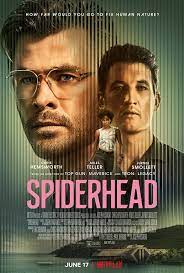
SPIDERHEAD
US, 2022, 106 minutes, Colour.
Chris Hemsworth, Miles Teller, Jurnee Smollett, Mark Paguio, Tess Haubrich.
Directed by Joseph Kosinski.
Spiderhead is an island with a facility for mental and physical patients. Audiences may be reminded of Martin Scorsese’s Shutter Island, again with its mysterious facility, the doctors, the staff, the patients and their mental conditions.
It would be good to be able to say that Spiderhead matches Shutter Island – but, no, it is slighter.
Stories which show a medical authority in control of patients and staff, experiments which may or may not be legitimate, suspicious methods, are reminders of the classic Doctor Frankenstein story. Doctor Frankenstein was trying to create life, to “play God”, a divine arrogance which created a monster.
To that extent, Spiderhead is a Frankenstein story. At the centre is a rather dashing young expert (Doctor or not?), played with easy charm by Chris Hemsworth. He is in control of the island – although he keeps referring to outside authorities. He is responsible. He has an assistant, Mark (Mark Paguio) diminutive, something of a yes-man, but a suspicious collaborator. And, on Spiderhead there are quite a number of patients.
The difference is that these patients have all been found guilty in a court but have opted to go to Spiderhead rather than serve in an ordinary jail. They seem to have something of a comfortable life despite the restrictions, can relate well to one another, be a chef in the kitchen, be a deputy for the Director.
The Director is interested in drugs, drugs creating particular mental states, controlling the subjects, manipulating them. Which means that there are quite a number of scenes where he is in control, one woman out of control, another being manipulated to erotic behaviour, a violent African who participated in genocide, a tattooed brute of a man…
However, his main interest is in a prisoner who had been responsible for the car crash death of friends and who is haunted by guilt, excepting the blame. He is Jeff, played by Miles Teller. Jeff is also under the control of drugs but has close-up focus, sitting in the control room with the Director and Mark, observing, going into the main room to be observed, to be manipulated, but, as we might guess, being morally challenged by what he sees.
And, the Director we suddenly find has the drug pack implanted in his back, so that he too has the hallucinatory experiences.
What follows is more or less what we might have developed in the plotline, Jeff and a relationship with the chef, and his stands, Mark overcoming fear and taking a stance, some mayhem with the patients, and expose of the Director.
The film was directed by Joseph Kosinski (Tron: Legacy, Only the Brave) who made it in Australia during the two-year delayed release of his Top Gun: Maverick, Spiderhead being released on Netflix three weeks after Top Gun (whose box office exceeded all expectations!).
- Future, science fiction, mind enhancing drugs, experiments and tests, exploitation? Echoes of the Dr Frankenstein mythology?
- The location, the sea and islands, the building and the prison, outside views, interiors, the laboratory, the observation room, the facilities in the prison? The musical score?
- The credibility of the plot, Steve Abnesti, his control, and answerable to no one? The setup, the experimental room, the observation room and technology? Working with Mark, Mark and his idealism? Disillusionment? The various chemicals, the Bingo chart, the numbers, the different drugs and their names, the various effects? The container, inserted into the backs of the prisoners, Steve and his own container and use of it?
- The visualising of the various tests and experiments, the man from Rob under and genocide, the women, the big tattooed man, Heather, Jeff and his part and the experiments? The effect of the different drugs, moods, happy, sad, aggressive, defensive? Forced copulation? Mark and his administering, wary?
- Steve, his own life, nothing outside the prison, his own pack, the drugs, at night, the effect? The Dr Frankenstein parallel, creating life, arrogant, destructive? Steve and his manner, smooth talker, smiling, moods?
- Jeff, the flashbacks to the accident, blaming himself, in prison, friendship with Steve, participating in the tests, the episode with Heather and his reaction, agreeing, being forced by Steve, observing, the tattooed man, Steve and the chart of interconnections, Jeff and his refusal? Standing up to Steve? The discussions with Mark? His friendship with Lizzie, her work in the kitchen, skills, bonding, love, her being tested, the moods, desperation, Steve forcing her to confess the death of her child? Jeff’s reaction, wanting to save her?
- The episode with Heather, the moods, the drugs out of control, her frenzy, killing herself?
- Steve, hurrying to the room, dropping his keys, Jeff getting the keys, examining his book, learning the truth?
- Lizzie and the experiments, Jeff rescuing her?
- Steve, desperation, the drugs, going to the plane, flying, the effect of the drugs, his crashing?
- Freedom for the prisoners, rushing the gate, pursuing Jeff and Lizzie, Jeff and Lizzie and the launch, freedom?
John Farrow. Man in the Shadow
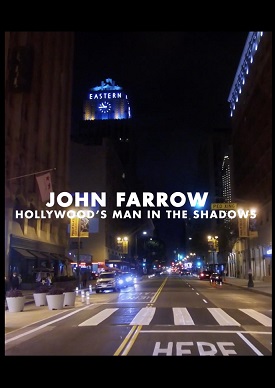
JOHN FARROW, MAN IN THE SHADOW
Australia, 2020, 96 minutes, Colour/black and white.
Directed by Claude Gonzalez, Frans Vandenberg.
This is a very interesting Australian documentary about Australian-born writer and director in Hollywood, John Farrow. He contributed to the writing of films from the late silent era into the 1930s, including Mutiny on the Bounty, but moving to direct his own films in the late 1930s, six in 1939 alone. But, as the title suggests, is not well known now.
The directors of this film have the advantage of access to footage from many of his films, especially those which were very well known in the 1940s and 1950s. There are extensive excerpts. The documentary also has the advantage of many talking heads, some prominent Australian directors including Bruce Beresford, Philippe Mora, Phillip Noyce, Ken Cameron as well is the French Bertrand Tavernier. And there are quite a number of historians and critics, especially Scott Murray and Charles high. (There are two sequences with the writer of this review, commenting on the devil in Alias Nick Beale and immoral commentary about John Farrow’s extramarital behaviour and Catholic response.)
In building up the story of John Farrow’s origins, Marrickville, Sydney, 1904, there are testimonies from various cousins, a touch of the folksy, but revealing the character of the director. The narrative is also taken up by Charles Farrow, Farrow’s third son who continues the commentary throughout the film. Audiences will then realise that Mia Farrow is one of his daughters. She did not collaborate with the film but the directors were able to get some television footage of interviews about her life and her family.
Farrow had an adventurous life, some turbulence in the family, his getting out of Australia, going to see, involved in all kinds of adventures – and which he drew for his writing and films. He jumped ship in San Francisco, married, began writing in Hollywood, divorced. However, some stability came to his life when he encountered Maureen O’Sullivan (and the film making comment about her upper class Irish background and its effect on her personality and her being a mother to so many children). There were seven children.
Farrow, originally Protestant, converted to Catholicism of his wife. One of the puzzling characteristics of Farrow is his interest in the history of the Catholic Church, his extensive writing on the church, on the history of the Pope’s, on his biography of Father Damien, the leper Priest on Molokai. There are also sequences of the churchgoing. However, Farrow had a severe personality, dominating and the family, Cpl punishment, somewhat tyrannical on the film sets. Later there is some revelation of his womanising.
So, while there is a substantial portrait of Farrow himself, the main thrust of the film is an admiration for his own films, the quality of his craft, his inventiveness in use of the camera, especially long takes which are well illustrated, and his working with actors.
His first prominent film was Five Came Back, an adventure which later generations would call a disaster movie, Wake Island dramatising the war in which he had served and had been injured. Oscar nominations. There is also a focus on the portrait of Hitler, by Bobby Watson, in The Hitler Gang. The list of his films in the IMDb shows that he was quite prolific at this time but the documentary having the opportunity to highlight only a few. Some notable films that are not included include To Years Before the Mast.
A great deal of attention is given to his films of the late 40s and early 50s, especially The Clock with Ramer land and Charles Laughton, with directors and critics and film historians highlighting the various qualities and techniques. There is his religious allegory, Alias Kapnick Beale. And two films with Robert Mitchum, Where Danger Lives, interestingly analysed and mention made of a seven minute take with Robert Mitchum and faith to mood. There is also His Kind of Woman, serious and comic, and interference from producer Howard Hughes.
While Farrow made a number of films in the first half of the 1950s, this documentary focuses on his western with John Wayne and Geraldine Paige, Hondo, filmed in 3-D. Farrow began directing Around the World in 80 Days, which he cowritten, but was fired by Mike Todd, the producer. However, the film won the Oscar for Best Film and Farrow for Best Screenplay. His last film was John Paul Jones, the documentary including footage taken in the background of the filming, his son Charles Farrow deciding that acting was not for him.
Much is made of Farrow stand against the inquisitorial methods of Sen McCarthy and the Communist accusations.
With illness, Farrow moved to television in the early 1960s, Maureen O’Sullivan meanwhile performing on stage in New York. He had a sudden heart attack and died at the age of 58.
An interesting documentary with a portrait, admiration for a filmmaker, and elements of critique.
Jurassic World: Dominion
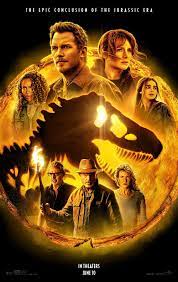
JURASSIC WORLD: DOMINION
US, 2022, 146 minutes, Colour.
Chris Pratt, Bryce Dallas Howard, Laura Dern, Sam Neill, Jeff Goldblum, DeWanda Wise, Mamoudou Athie, Isabella Sermon, Campbell Scott, BD Wong, Omar Sy, Justice Smith, Daniela Pineda, Scott Haze, Dichen Lachman.
Directed by Colin Trevorrow.
It’s almost 30 years since Steven Spielberg amazed the cinema world in his adaptation of Michael Crichton’s story of dinosaurs and the dinosaur park, Jurassic. There have been a number of sequels, including the more recent stories of Claire, Owen and Maisie and the attempt to tame and foster dinosaurs – despite some spectacular destructive consequences.
This film is the conclusion of that trilogy – but it is also the conclusion of the original stories, bringing all the characters together. So, while there is an appeal to the new audiences as well as to the older audiences, there is a new focus in the Jurassic story, the development of experiments in a huge institution, Biosyn, managed by a seemingly quiet scientist but who has enormous world power ambitions, experimenting with creatures, a different version of Dr Frankenstein, wanting to create new animal lives. Despite his quiet appearance, as played by Campbell Scott, he is still enormously arrogant and his pride will come before an enormous fall.
This film introduces Claire and Owen and Maisie again, Claire (Bryce Dallas Howard) doing a raid to capture a dinosaur from captivity. Owen (Chris Pratt) is living a more retired life. And there is their adopted daughter, Maisie (Isabella Sermon) who is abducted. Scene set for all kinds of adventures!
First port of call, so to speak, is Malta, with lots of location photography in the old cities. Enter a sympathetic but tough military type pilot, Kayla (DeWanda Wise) who has a touch of compassion and helps the anxious parents who are trying to find Maisie. In Malta, there is a huge underground market in illegal creatures, a dinosaur chase and motorbike through the narrow streets, and a plane taking off to go to Biosyn (and all kinds of aviation difficulties and landings!). So, plenty of action so far.
But then the oldies appear, Jeff Goldblum giving a lecture to eager students but offering a pessimistic view of human endeavour, humans overreaching themselves. And, visiting, Alan and Ellie (Sam Neill and Laura Dern), being welcomed to Biosyn but being alerted to Biosyn arrogance and immediately becoming involved in some biological espionage. And Maisie discovers the truth about her mother and her involvement at Jurassic Park.
And, at Biosyn, there are dinosaurs galore for those who feel the need to see them, huge, dangerous, in action.
It then becomes a huge action adventure, with a dangerous “cliffhanger” every couple of minutes, everybody having to use their wits, escape the dinosaurs and menace, get the plane going, aided by a sympathetic assistant to Biosyn (Mamoudou Athie), plenty of adrenaline pumping.
Perhaps this is enough Jurassic adventure for the time being. But, sequels being what they are, who knows?
- The impact of Jurassic Park, the 1990s, the sequels, the new film is in the 2010 is, further developments, parallels in the plots? This film is culmination?
- The work of Michael Crichton, characters, dinosaurs, issues, science and arrogance, dangers? The subsequent films taking his characters, parallel characters, repeating situations and crises?
- This film is the last in the series? The last in the second trilogy? Bringing characters and themes together?
- Clare, Maisie, this story, as characters, and from the past films, bonding together, adopting Maisie, Maisie and the explanation her background, Charlotte, the pregnancy, the powers, the scientific investigation and DNA? Owen and his training the dinosaurs? Claire and her concerns? The opening, the rescue, the dangers? Maisie and the abduction, their concern, flying to Malta, the search in Malta, the exploiters of dinosaurs and animals, meeting Kayla, the flight, the crash landing, the dangers, the adventures, encountering Ramsey, Alan and Ellie, the rescue, the helicopter, the dangers, the encounter Henry will? The final escape?
- The Biosyn story, Lewis and Dodgson, his manner, dedication, his ambitions, the tradition of Jurassic Park, the DNA investigations, the power for good and healing, financial issues, power issues? The locus, the devastation, his creating the locusts? The laboratories and samples? Ramsey as his partner, the loyalties, Dodgson’s hopes? Dr Henry Wu, the background of Jurassic Park, his DNA investigations, his failures in the past? His wanting to rectify the situation, the pressure from Dodgson, the threats? The range of people working in the area, security, strongman tactics and investigations?
- The vastness of Biosyn, the plant, the laboratories, the corridors, basements, vehicles and tracks…?
- The presence of the dinosaurs, the initial rescue by Clare, Maisie and her pet dinosaur, both she and the dinosaur abducted by Dodgson’s orders? The ruthlessness of the controllers, Santos in Malta, the arrangements, her laserbeam on targets and dinosaurs attacking? The range of dinosaurs, the special effects, introduction into the plot, an abundance of dinosaurs? And human close encounters with dinosaurs? In Malta, the rampage in the streets? The flight on the landing and the dinosaur attacking the helicopter? In Biosyn, the confrontations of the dinosaurs? The threats to the humans?
- The story with Ian, Alan and Ellie? The reputation, their agreement to come to Biosynin, the welcome from Dodgson, the welcome from Ramsey, the tours? Ian, his lecture, his pessimism, warning against developments in science to the detriment of the human race? The applause? His giving the key to Alan and Ellie, wanting them to get a locust sample to expose Biosyn? Their disguises, getting the sample, the plague of the locusts, their escape? Ramsey helping them? Teaming up with Ian? The confrontation with Dodgson?
- Dodgson, his controls, threatening to destroy the helicopter, Denise and her help to Kayla? The betrayal by Ramsey? Henry will and his escape? Dodgson isolated, setting Biosyn aflame, the destruction of the locusts, the threat to the dinosaurs? His escape, the vehicle, the power going down, his attempt to escape, the attack, threats and his death?
- The range of cliffhangers, dangers, rescues, adrenal excitement for the audience?
- The characters from the past, their different characteristics, the memories, audiences glad to see them again? Participating in the dangers and escape? The newer family, audiences remembering their exploits, glad to see them again?
- The final drama, the dangers, the dinosaurs, Kayla and helicopter, the final escape?
- The film and its Dr Frankenstein themes, arrogance, ambition, creating life, yet leading to monstrosities and destruction and threats to the human race?
Kill Chain
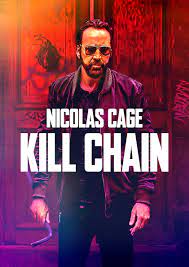
KILL CHAIN
US, 2019, 91 minutes, Colour.
Nicolas Cage, Anabelle Acosta, Enrico Colantoni, Ryan Kwanten, Angie Cepeda, Eddie Martinez.
Directed by Ken Sanzel.
Kill Chain is one of the many action films that Nicolas Cage made during the 2010 is and continued into the 2020s, with some satire and homage in The Unbearable Weight of Massive Of Talent.
The setting is Mexico, a seedy -looking hotel, owned by Nicholas Cage who gives an explanation of how he came to be there – twice, once at the beginning of the film, setting the scene, and once when the chain narrative comes round to a climax. He has an explanation of working with his partner as mercenary, a complicated life of violence.
There is another narrative which seems to be unconnected but which the audience have to work on. It involves Ryan Quantum as a corrupt policeman, an attack on drug dealers and the setting up of further deals.
There is also a femme fatale, seen initially during the hotel explanation scene, later explanation of who she is, what has happened to her, pursuit, taking refuge with Cage?
There is also a flashback story to a little girl who is taken, who grows up, and he decides to move out of the hotel and take up with criminals.
Standard material one might say but presented in a very complex, perhaps better put, complicated way, that many of the action fans will find difficult to put together – and so will other audiences.
Music of Silence, The
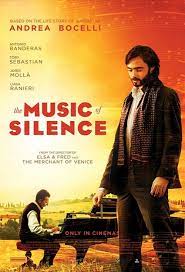
THE MUSIC OF SILENCE
Italy, 2017, 115 minutes, Colour.
Toby Sebastian, Jordi Molla, Antonio Banderas, Luisa Ranieri, Ennio Fantaschini.
Directed by Michael Radford.
This Italian production, spoken in English, is based on the autobiography of the same name by renowned singer, Andrea Bocelli. At the beginning, he talks about the choice of a name, Amos Accardi, and this biography runs with this family name and a focus on Amos.
Bocelli himself appears at the beginning of the film, black-and-white footage, and, at the end of the film, further footage of himself, his wife, performances – and a collage of photos and footage of his meeting with world celebrities including Queen Elizabeth, Bill Clinton and, three popes.
While the film is straightforward, conventional, in its storytelling of the life of Amos/Andrea, it has a great appeal to many audiences, the story of a family, the story of a child and the discovery of disabilities with eyesight, blindness, the burdens on the child as he grows up, possibilities for his life.
The film has the advantage of Jordi Molla as the father, Toby Sebastien as the older Amos, and a very sympathetic, not immediately recognisable with his beard, Antonio Banderas as the maestro who is able to train Amos’s voice and preparing for a career.
The film was directed by Michael Radford, British Dir with a range of credits, very different from each other, including 1984, White Mischief, you’ll Pristine oh, The Merchant of Venice, Elsa and Fred.
The film recreates the atmosphere of Italy in the 1960s to the 1990s. And, it traces the love of music and the young Amos, as a little child attracted by music, singing at school, winning competitions, the dilemma of what he could do with his life, legal studies, playing piano in a bar with his friend, composing… But the mood changes with his time with the Maestro, but also the disappointments of not being able to rule with the star, To grow, agents ignoring him. However, he does get his final chance, always with the strong support of his uncle, his relationship with Enrica who was to be his first wife, then his career.
And, for audiences who like to listen to Andrea Bocelli, many musical pieces throughout the film.
- Audience knowledge of Andre Bocelli, his singing career, his blindness, the triumph of singing over the limits of blindness?
- Audience knowledge of Bocelli’s background, Amos Bacardi, his family, loving parents, the difficulties with his eyes, as a boy, coping with difficulties, music, going to board, the effect, his singing talent? His teenage years, legal studies, singing in the cafe? Encouragement in music? The May/, the lessons, over many years, loss of opportunities, opportunities? Final success?
- The film based on Andre Bocelli is autobiography? His appearances, singing? His career framing the narrative? The collage of photos, of celebrities, Queen Elizabeth, Bill Clinton, three popes…?
- The conventional way of telling a life story, the background, the family, difficulties, early years, challenges, growing up, hard life, opportunities, losses?
- The portrait of Amos’s parents, the hard work, the family, the eagerness with Amos’s birth, attending him, the discovery of his eyesight and difficulties, coping at home, the younger brother? The other members of the family? The uncle and aunt and their presence? The parents over the years, love for their son, difficulties, his going to board, coming home, the teenage years and trying to influence him, the influence to do legal studies, standing by him in singing competitions, and their joy in his winning, at the cafe, sharing in the final triumph?
- The little boy, listening to the music through the wall, talking with the blind musician? Later singing, at school, playing sport and the hit on the head with the ball and its consequences, the encouragement of the musician teacher, the competition, the other candidates, his performance, the final, the professor judging, his winning?
- Disappointment that this did not lead to a singing career, explanations of blindness preventing him from performing on stage, in Opera, seeing the conductor…?
- The bond with his friend, their meeting, time together, mutual support? Musicians, playing together, composition? The various performances in the cafe, the performance of the wedding? The singing at the wedding when his voice broke and the effect on him? Playing in the cafe, night after night, the audience, the wedding and singing, Enrica, her background, studies, attached to Andre, the bond and relationship? (In real life, the marriage, child, the separation after 10 years?)
- The uncle, his continued concern, love for his nephew, finding opportunities, the singing competition, winning, joy? Family celebrations? Arranging the audition with the music critic who& Andre and uncle throwing wine in his face, denouncing him? Following Andre career, the cafe?
- The May/, meeting with Andre, the discussions, the lessons, the details, fine tuning his voice? Choices for Andrea? The super of and the possibility of touring, Pavarotti? The agents, Cavalier attitudes? Andrea waiting for a long time?
- The eventual phone call, the invitation to travel, to sing, the concert in the partnership with Socorro? The beginning of the beginning?
- Subsequent career, Opera, concerts throughout the world, his reputation, his second marriage, Veronica as his manager, record-breaking performances, record-breaking with records sold, meeting celebrities? And his life and career continuing?
Hijo, El/ The Son
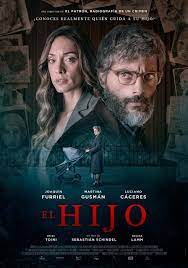
EL HIJO/ THE SON
Argentina, 2019, 92 minutes, Colour.
Joaquin Furriel, Martina Gusman, Luciano Caceras, Heidi Toini, Regina Lamm.
Directed by Sebastian Schindel.
Argentinian Director, Sebastien Schindler, has made a number of intriguing films focusing on intense personal relationships as well as crime, The Boss, The Wrath of God.
This film has intrigued many audiences but also frustrated many, as can be seen in denunciations in the IMDb. And this, especially, concerns the ending. However, as with his other films, there are enough clues in the screenplay for audiences to make up their own minds as to what has happened in the plot and, especially, with the ending.
At the centre of the film is a Bohemian artist, separated from his wife, no contact with his daughter’s, drinking in the past, something of a celebrity with his art. In middle age, he has married a Norwegian scientist involved in experiments in Argentina (illustrated by the elaborate credits sequence). She becomes pregnant, invites the midwife who helped in her own birth to come and live, speaking Norwegian, edging out Lorenzo, the artist.
As with shingles other films, the narrative moves from the present to the past, often without warning. The narrative then fills out the artist’s background, as well is fast forwarding to his being put in jail, gradual information that a son has been born (then the visuals of that episode, alienation from his wife because of her restrictive control over his son, the influence of the Norwegian midwife, the divorce, his violent reactions. He is helped by a close friend from the past and her husband, sympathetic, helping with legal matters, his asking them to be godparents to his son.
There is quite some tension in the audience identifying with Lorenzo but frustrated by his range of moods and behaviour, discussions about custody of the child, Lorenzo into being with tragic consequences.
The mystery for audiences is in the sequence, two years later, the godparents with the little boy, the return of the wife and midwife to Argentina and the issue of how many sons there were, who is the real son…
- The title? Pregnancy and birth? Obsessive parenting? Parents unable to have children?
- The Argentinian setting, the home of the artist, studio, the contrast with apartments, comfortable homes? Outings, the streets, art galleries? The musical score?
- Lorenzo, his story, age, artist, Bohemian, giving up drinking, separation from his first wife, not contacting his daughters, marrying Sigrid, his devotion to her, her pregnancy, exceeding to her whims, at home, food, at the Gallery, her wanting to leave?
- The arrival of the Norwegian midwife, helping with Sigrid’s birth, dominating the house, their talking in Norwegian, excluding Lorenzo? Sigrid giving birth, Lorenzo outside the door, her screams? Lorenzo going in, Sigrid tranquil with the son? Lorenzo and his devotion?
- The screenplay fast forwarding, Lorenzo’s arrest, the audience wondering, in prison, the treatment? Julieta, the relationship from the past, her loyalty to him, coming to the police station, acting as his lawyer? His behaviour in prison, the diagnosis of his psychological problem, assuming that there had been substitution of persons? His being allowed out, the apartment, painting?
- The buildup to Lorenzo’s behaviour after the birth, his being excluded, the child and mother in the dark, the Norwegian midwife as the barrier, his being allowed to see the child, his concern about the health, taking the child to the hospital? Return, the police, the accusation, the physical clash with Sigrid, his past reputation against him?
- Lorenzo staying with Julieta and Renato for three months, their help? Sigrid and the hearing, wanting to take the child to Scandinavia, Julieta and her opinions, Lorenzo wanting to seize the boy, giving his consent? The outing with Julieta and Renato, Julieta unable to have a child, thinking of adoption? Lorenzo leaving the house, Julieta and Renato going to his apartment, seeing all the sketches of the boy, going back to the house, discovering Lorenzo dead?
- Lorenzo in the house, the midwife, Sigrid and the rifle, his seeing the bags packed for Scandinavia? His death? His arranging for Renato and Juliet are to be godparents? The police giving them custody?
- Two years later, happy with the boy, the sighting of the midwife, tracking her to the forest house, the clothes line, the children’s clothes?
- The ambiguity for the audience, did Sigrid have twins, keeping one and letting Lorenzo see the other, giving him the other, taking one to Scandinavia, the return? The possibility of Sigrid abducting another child and giving it to Lorenzo? The variety of possibilities?